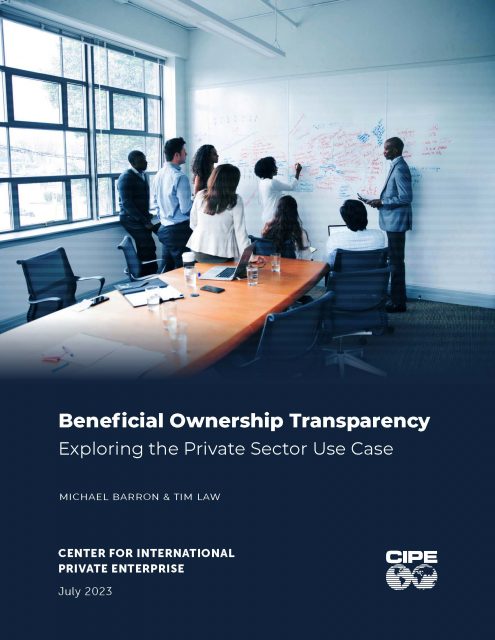 CIPE’s newest report, “Beneficial Ownership Transparency — Exploring the Private Sector Use Case,” arrives at a critical time. Building on the tremendous progress made by advocates in setting out beneficial ownership (BO) standards and inviting countries to commit to BO reforms, the anti-corruption community is increasingly focused on moving from commitment to action.
CIPE’s newest report, “Beneficial Ownership Transparency — Exploring the Private Sector Use Case,” arrives at a critical time. Building on the tremendous progress made by advocates in setting out beneficial ownership (BO) standards and inviting countries to commit to BO reforms, the anti-corruption community is increasingly focused on moving from commitment to action.
Globally, over 120 countries have committed to collecting BO data, and more than 50 countries are implementing some form of a BO register. However, to ensure implementation lives up to the ambitions and aspirations of those championing the cause, more work needs to be done. There is a simmering unease over whether the movement can deliver on its potential.
BO registers should have accurate, verified, and up-to-date information on who ultimately benefits from owning and controlling commercial entities. In addition, the collected data would need to be publicly accessible to enable the business community, governments, and civil society alike to protect against fraud, mitigate investment risks, and fight back against corruption.
In practice, many registers are either closed to the public, contain unverified information, or suffer other shortcomings that limit their utility. To maintain momentum and drive continued BO implementation reform at the country level, CIPE’s new report distills and explains the range of use cases BO data have for the private sector. In addition, the report explores how the benefits of BO reform could be better communicated between stakeholders, using insights gleaned in three spotlight countries – Armenia, Kenya and Senegal.
The report, written by Michael Barron and Tim Law, marks the start of CIPE’s engagement in support of the wider BO community to facilitate the emergence of a broader coalition of stakeholders vested in future reform efforts, including by enlisting the private sector as a key ally. It provides recommendations on how BO advocates can engage with the business community — in different contexts and in pursuit of viable reforms in countries around the world. The report can be downloaded here.
Overarching takeaways include:
- The private sector is not a single, homogeneous actor. It is important to identify which sectors will derive the most benefits from well-designed BO reform efforts: to reduce operational and investment risks, to gain access to markets, and to realize savings on compliance costs. Doing so will help to identify how the coalition of BO advocates can be strengthened and who is most likely to join.
- Making allies of the private sector requires reframing the prevailing BO narrative to showcase the benefits of BO at the country level and across different industries and sectors.
- Better and more regular communication between stakeholders is crucial to bring business into the fold to establish trust and consistency. The focus of these communications will vary from country to country and will depend on both context and the state of ongoing reform efforts.
- Emerging evidence on the use case corroborates the utility of BO data for the business sector. To help make the case for additional private sector actors joining the coalition of BO supporters, more evidence is needed, and trailblazing companies can undertake formal or informal assessments internally to help make the case for why companies stand to benefit from publicly available and verified BO information.
Published Date: August 30, 2023